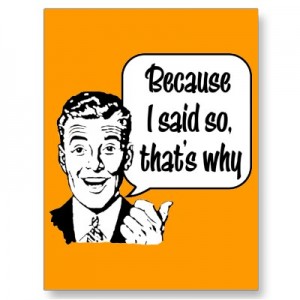Because I Said So
0 comment

There are some other phrases that I have also never uttered, such as “Because I said so!” Never as a parent, teacher, consultant, boss, have I ever said—or even had that phrase flit through my brain—that line. Another phrase I also have never uttered as teacher or consultant is, “Because I am the expert!” (In fact, I cringe when others refer to me as an expert, so I cannot imagine such a self-referral). That approach just isn’t compatible with a good consultant.
I opened a can of worms with that pronouncement, as it begs the question of just what is a good consultant? Someone who does a good job at consulting. But, what do we truly mean by consulting? What does it mean to consult? Looking at definitions from the leaders in the field—those dead and alive—doesn’t necessarily move clarity forward. But the definition—all three, actually–provided by Merriam Webster’s student dictionary, takes us back to basics
1 : to seek the opinion or advice of <consult a doctor>
2 : to seek information from <consult a dictionary>
3 : to talk something over <have to consult with my lawyer>
In none of these definitions is there a suggestion of totalitarianism; rather, one of give and take, of empowering the seeker to make her own decisions, adding the newly found and acquired information to the pre-existing toolbox. Nowhere is the suggestion of “Because I am the expert” even remotely there. One of the criteria of Peter Block’s flawless consultant, as outlined in his book Flawless Consulting: A Guide to Getting Your Expertise Used, is to tell the truth, the most powerful tool, he says, for gaining a client’s trust and follow-through.
Well, then, let’s be honest: so much of consulting work is only part science—knowledge backed by good research and data—and the rest is art—feeling the moment, paying attention to cues, trusting gut, doing what “seems” right or best, interjecting nuances. Sure, there are best practices and best practices are absolutely great goals. But the truth—there it is again–is that not every organization has the capability—or the desire or interest—to attain best practices. Thus, once again, the balance of science and art: science says do this; art says the group isn’t quite ready so let’s stop here, along the route to best practice. None of this allows for the foot stomping that I associate with the person who would utter such a shutting-down-learning-and-thinking phrase as “Because I said so/am the expert!”
Here’s a great example: last month, a study coming from professors at Rice University, University of Texas, San Antonio, and Penn State, revealed that political affiliation influences people’s charitable giving decisions. Before you say, “Duh!”, listen up. This study wasn’t looking at which charities those of one party give to as opposed to those to which members of the other part give. No, this study was looking at what influences Democrats and Republicans to give to the same charity. What the researchers found was that slight and even subtle changes in emphasis or phrases to show a stronger alignment with Republican values increased, multiple times, the chances that a Republican would give to that charity; that slight and subtle change to suggest an alignment with Democratic values, and Democratic giving increased multiple fold.
What this study so perfectly reveals is what we already know: one size never fits all. It doesn’t in wooing donors, it doesn’t in running organizations, it doesn’t in building boards, it doesn’t in anything. Thus, an “expert”, or anyone, who claims s/he has the answer, that it is her/his way or the highway, that there are no options, is, in fact, anything but an expert.
A consultant who makes the same claims is not a consultant with whom you should work. Consulting is about explaining the science, revealing the art and helping staff, board, organizations make the decisions that are right for them. That is the expertise that a great consultant will bring to your table.
The opinions expressed in Nonprofit University Blog are those of writer and do not necessarily reflect the opinion of La Salle University or any other institution or individual.
